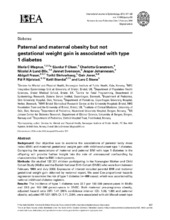| dc.contributor.author | Magnus, Maria Christine | en_US |
| dc.contributor.author | Olsen, Sjurdur Frodi | en_US |
| dc.contributor.author | Granström, Charlotta | en_US |
| dc.contributor.author | Lund-Blix, Nicolai Andre | en_US |
| dc.contributor.author | Svensson, Jannet | en_US |
| dc.contributor.author | Johannesen, Jesper | en_US |
| dc.contributor.author | Fraser, Abigail | en_US |
| dc.contributor.author | Skrivarhaug, Torild | en_US |
| dc.contributor.author | Joner, Geir | en_US |
| dc.contributor.author | Njølstad, Pål Rasmus | en_US |
| dc.contributor.author | Størdal, Ketil | en_US |
| dc.contributor.author | Stene, Lars Christian Mørch | en_US |
| dc.date.accessioned | 2019-04-09T14:35:31Z | |
| dc.date.available | 2019-04-09T14:35:31Z | |
| dc.date.issued | 2018-02-05 | |
| dc.Published | Magnus MC, Olsen SF, Granström C, Lund-Blix NA, Svensson J, Johannesen J, Fraser A, Skrivarhaug T, Joner GJ, Njølstad PR, Størdal K, Stene LC. Paternal and maternal obesity but not gestational weight gain is associated with type 1 diabetes. International Journal of Epidemiology. 2018;47(2):417-426 | eng |
| dc.identifier.issn | 1464-3685 | |
| dc.identifier.issn | 0300-5771 | |
| dc.identifier.uri | https://hdl.handle.net/1956/19308 | |
| dc.description.abstract | Background Our objective was to examine the associations of parental body mass index (BMI) and maternal gestational weight gain with childhood-onset type 1 diabetes. Comparing the associations of maternal and paternal BMI with type 1 diabetes in the offspring will provide further insight into the role of unmeasured confounding by characteristics linked to BMI in both parents. Methods We studied 132 331 children participating in the Norwegian Mother and Child Cohort Study (MoBa) and the Danish National Birth Cohort (DNBC) who were born between February 1998 and July 2009. Exposures of interest included parental BMI and maternal gestational weight gain obtained by maternal report. We used Cox-proportional hazards regression to examine the risk of type 1 diabetes (n=499 cases), which was ascertained by national childhood diabetes registers. Results The incidence of type 1 diabetes was 32.7 per 100 000 person-years in MoBa and 28.5 per 100 000 person-years in DNBC. Both maternal pre-pregnancy obesity, adjusted hazard ratio (HR) 1.41 [95% confidence interval (CI): 1.06, 1.89] and paternal obesity, adjusted HR 1.51 (95% CI: 1.11, 2.04), were associated with childhood-onset type 1 diabetes. The associations were similar after mutual adjustment. In contrast, maternal total gestational weight gain was not associated with childhood-onset type 1 diabetes, adjusted HR 1.00 (95% CI: 0.99, 1.02) per kilogram increase. Conclusions Our study suggests that the association between maternal obesity and childhood-onset type 1 diabetes is not likely explained by intrauterine mechanisms, but possibly rather by unknown environmental factors influencing BMI in the family. | en_US |
| dc.language.iso | eng | eng |
| dc.publisher | Oxford University Press | eng |
| dc.relation.uri | https://www.ncbi.nlm.nih.gov/pmc/articles/PMC5913633/ | |
| dc.rights | Attribution CC BY | eng |
| dc.rights.uri | http://creativecommons.org/licenses/by/4.0/ | eng |
| dc.subject | Body mass index | eng |
| dc.subject | parents | eng |
| dc.subject | Pregnancy | eng |
| dc.subject | Diabetes type 1 | eng |
| dc.subject | weight gain | eng |
| dc.subject | Obesity | eng |
| dc.subject | Pregnancy | eng |
| dc.subject | body mass index procedure | eng |
| dc.subject | Diabetes mellitus | eng |
| dc.subject | type 1 | eng |
| dc.subject | Child | eng |
| dc.subject | mothers | eng |
| dc.subject | parent | eng |
| dc.subject | gestational weight gain | eng |
| dc.subject | maternal obesity | eng |
| dc.title | Paternal and maternal obesity but not gestational weight gain is associated with type 1 diabetes | en_US |
| dc.type | Peer reviewed | |
| dc.type | Journal article | |
| dc.date.updated | 2018-06-19T12:46:20Z | |
| dc.description.version | publishedVersion | en_US |
| dc.rights.holder | Copyright The Author(s) 2018 | |
| dc.identifier.doi | https://doi.org/10.1093/ije/dyx266 | |
| dc.identifier.cristin | 1592355 | |
| dc.source.journal | International Journal of Epidemiology | |

